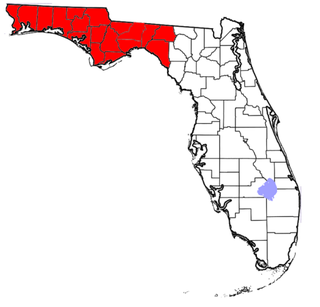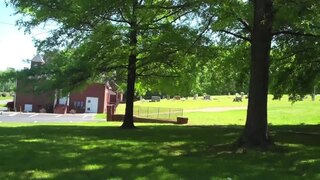Related Research Articles

The University of Florida is a public land-grant research university in Gainesville, Florida. It is a senior member of the State University System of Florida, traces its origins to 1853, and has operated continuously on its Gainesville campus since September 1906.
Historically black colleges and universities (HBCUs) are institutions of higher education in the United States that were established before the Civil Rights Act of 1964 with the intention of primarily serving African Americans. Most of these institutions were founded during the Reconstruction era and are concentrated in the Southern United States. During the period of racial segregation in the United States, the majority of American institutions of higher education served predominantly white students, and disqualified or limited black American enrollment. Later on some universities, either after expanding their inclusion of Black people and African Americans into their institutions or gaining the status of minority-serving institution, became Predominantly Black Institutions (PBIs).

The Florida Panhandle is the northwestern part of the U.S. state of Florida; it is a salient roughly 200 miles (320 km) long and 50 to 100 miles wide, lying between Alabama on the north and the west, Georgia on the north, and the Gulf of Mexico to the south. Its eastern boundary is arbitrarily defined. In terms of population, major communities include Tallahassee, Pensacola, and Panama City.

The Rosenwald School project built more than 5,000 schools, shops, and teacher homes in the United States primarily for the education of African-American children in the South during the early 20th century. The project was the product of the partnership of Julius Rosenwald, a Jewish-American clothier who became part-owner and president of Sears, Roebuck and Company and the African-American leader, educator, and philanthropist Booker T. Washington, who was president of the Tuskegee Institute.
Florida State University Panama City is located 100 miles (160 km) from the Tallahassee campus in Panama City, Florida. Established in 1982, the campus serves more than 4,000 students supported by 20 bachelor's and 9 graduate degree programs on campus and online.
Paul R. Bartrop is an Australian historian of the Holocaust and genocide. From August 2012 until December 2020 he was Professor of History and Director of the Center for Judaic, Holocaust and Genocide Studies at Florida Gulf Coast University, Fort Myers, Florida. Between 2020 and 2021 he was an honorary Visiting Professorial Fellow at the University of New South Wales, Canberra. In April 2021 he became Professor Emeritus of History at Florida Gulf Coast University, and in 2022 he became an honorary Principal Fellow in History at the University of Melbourne. During the academic year of 2011-2012 he was the Ida E. King Distinguished Visiting Professor of Holocaust and Genocide Studies at Richard Stockton College of New Jersey.

WKGC-FM is a radio station licensed to Panama City, Florida, United States. The station is currently owned by Gulf Coast State College.

Gulf Coast State College is a public college in Panama City, Florida. It is part of the Florida College System and offers the Associate of Arts degree, Associate of Science degree, certificates, and as of 2011, bachelor's degrees.
Suwannee River Junior College, located in Madison, Florida, opened in 1959. It was one of eleven black junior colleges founded in the late 1950s at the initiative of the Florida Legislature. Since racial integration in schools was prohibited in the Florida Constitution of 1885 then in effect, the Legislature wished to avoid the integration mandated in the unanimous Brown v. Board of Education Supreme Court decision of 1954 by demonstrating that a "separate but equal" higher education system existed in Florida for African Americans.
Roosevelt Junior College was an institution serving African-American students, located on an 18-acre campus at 1235 Fifteenth Street in West Palm Beach, Florida. It took its name from the adjacent black Roosevelt High School, named in honor of former U.S. President Theodore Roosevelt.
Booker T. Washington Junior College, the first and longest-lasting junior college for African Americans in Florida, was established by the Escambia County school board in 1949. Previously, the only higher education available in Florida to African Americans was at Bethune-Cookman College, Edward Waters College, Florida A&M University, and Florida Memorial College, all historically black.
Gibbs Junior College was created in 1957 by the Pinellas County Board of Public Instruction to serve African-American students in St. Petersburg, Florida. It was the first and most successful of Florida's eleven new African-American junior colleges, founded in an unsuccessful attempt to avoid the racial integration mandated by the unanimous 1954 Supreme Court Brown v. Board of Education decision. It was named for the minister and abolitionist Jonathan C. Gibbs, who opened a private school for freed slaves after the Civil War, and was later Florida's Secretary of State (1868–1872) and then Superintendent of Public Instruction, the first African-American member of the Florida Cabinet.
Jackson Junior College, in Marianna, Florida, county seat of Jackson County, opened its doors in 1961. It was one of eleven black junior colleges founded in the late 1950s at the initiative of the Florida Legislature. Since racial integration in schools was prohibited in the Florida Constitution of 1885 then in effect, the Legislature wished to avoid the integration mandated in the unanimous Brown v. Board of Education Supreme Court decision of 1954 by demonstrating that a "separate but equal" higher education system existed in Florida for African Americans. Support by local African Americans, who wanted integration, was unenthusiastic.
Carver Junior College, in Cocoa, Florida, was established by the Brevard County Board of Public Instruction in 1960 to serve black students, at the same time that it founded Brevard Junior College, now Eastern Florida State College, for white students. It was named for the black agricultural researcher George Washington Carver. Like 10 of Florida's other 11 black junior colleges, it was founded as a result of a 1957 decision by the Florida Legislature to preserve racial segregation in education, mandated under the 1885 Constitution that was in effect until 1968. More specifically, the Legislature wanted to show, in response to the unanimous Supreme Court decision mandating school integration, that the older standard of "separate but equal" educational facilities was still viable in Florida. Prior to this legislative initiative, the only publicly funded colleges for negro or colored students were Florida A&M University, in Tallahassee, and Booker T. Washington Junior College, in Pensacola.
Hampton Junior College, located in Ocala, Florida, opened its doors in 1958. It was one of eleven black community colleges which were founded, at the urging of the Florida Legislature, to show that a "Separate but equal" educational system for blacks existed in Florida; the Legislature wished to avoid the integration mandated by the Supreme Court's Brown v. Board of Education decision of 1954. At the time, the closest public college that would accept negroes was Florida A&M University, 175 miles away.
Volusia County Community College, located at 875 Second Avenue in Daytona Beach, Florida, opened its doors in 1958. It was one of twelve black junior colleges founded in the late 1950s at the initiative of the Florida Legislature. Since racial integration in schools was prohibited in the Florida Constitution of 1885 then in effect, the Legislature wished to avoid the integration mandated in the unanimous Brown v. Board of Education Supreme Court decision of 1954 by demonstrating that a "separate but equal" higher education system existed in Florida for African Americans.
Collier-Blocker Junior College, located at 1100 N. 19th Street in Palatka, Florida, opened its doors in 1960. It was one of eleven black junior colleges founded in the late 1950s at the initiative of the Florida Legislature. Since racial integration in schools was prohibited in the Florida Constitution of 1885 then in effect, the Legislature wished to avoid the integration mandated in the unanimous Brown v. Board of Education Supreme Court decision of 1954 by demonstrating that a "separate but equal" higher education system existed in Florida for African Americans.
Lincoln Junior College, located in Fort Pierce, Florida, opened its doors in 1960, at the same time as Indian River Junior College, restricted to white students. It was designed to serve Indian River, Martin, Okeechobee, and St. Lucie counties. It was one of eleven black community colleges which were founded, at the urging of the Florida Legislature, in the late 1950s and early 1960s to show that a "separate but equal" educational system for blacks existed in Florida; the Legislature wished to avoid the integration mandated by the Supreme Court's Brown v. Board of Education decision of 1954. At the time, there was no nearby college for Negroes, while the distances and lack of funding effectively closed off most local blacks from college.
Johnson Junior College, located at 1200 N. Beecher St. In Leesburg, Florida, opened its doors in 1962, for black students, at the same time as Lake–Sumter Junior College, for white students. It was designed to serve Lake and Sumter Counties. It was one of eleven black community colleges which were founded, at the urging of the Florida Legislature, in the late 1950s and early 1960s to show that a "separate but equal" educational system for blacks existed in Florida; the Legislature wished to avoid the integration mandated by the Supreme Court's Brown v. Board of Education decision of 1954. At the time, there was no nearby college for Negroes, and the distances and lack of funding effectively closed off most local Blacks from college.
References
- ↑ Florida Division of Historic Resources, "The Rosenwald School of Panama City", http://www.visitflorida.com/en-us/articles/2008/july/944-the-rosenwald-school-of-panama-city.html, retrieved April 21, 2016.
- ↑ Russell Booker, "The Rosenwald Schools: An Impressive Legacy of Black-Jewish Collaboration for Negro Education", America's Black Holocaust Museum, "America's Black Holocaust Museum | the Rosenwald Schools: An Impressive Legacy of Black-Jewish Collaboration for Negro Education". Archived from the original on 2013-06-15. Retrieved 2016-03-02., retrieved April 21, 2016.
- ↑ Walter L. Smith, The Magnificent Twelve: Florida's Black Junior Colleges, Winter Park, Florida, FOUR-G Publishers, 1994, ISBN 1885066015, p. 101.
- ↑ Smith, p. 105.
- ↑ Smith, p. 102.
- ↑ Unidentified clipping, probably the News Herald, mistakenly dated 1958, Gulf Coast Community College archives, http://gulfcoast.sobek.ufl.edu/GCSC000859/00001, retrieved April 22, 2016.
- ↑ Kevin M. McCarthy, African American Sites in Florida, Pineapple Press, 2007, ISBN 1561643858, p. 12.
- ↑ Smith, p. 111.
- ↑ Ivie Burch, an administrator at Rosenwald, quoted in Smith, p. 120
- ↑ Smith, p. 109.
- ↑ Zack McDonald, "Museum to display history of Rosenwald Junior College," News Herald (Panama City, Florida), February 13, 2014, http://m.newsherald.com/article/20140213/news/302139975, retrieved April 21, 2016.